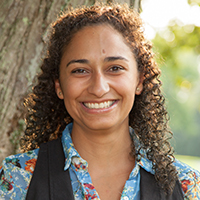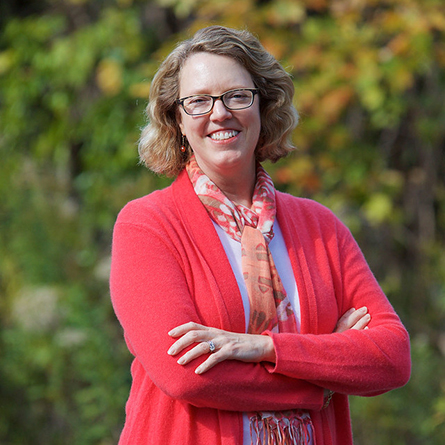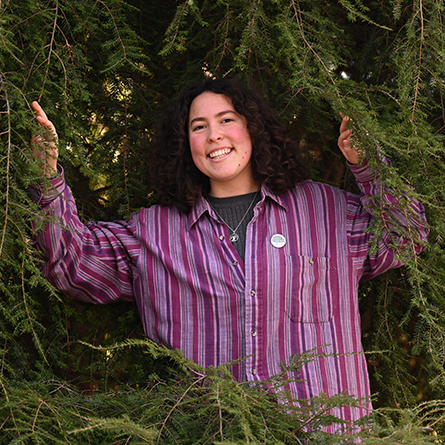
Flyways not Highways
East of Cleveland, the border separating the cities of Cleveland Heights and Shaker Heights runs along a modest-size ribbon of greenery and lakes. This welcome patchwork, known as Shaker Parklands, is in part a recreation site. On a typical sunny day it draws the full spectrum of users you’d expect—joggers, bicyclists, dog walkers, birders, and hand-holding couples out for a stroll. In addition, it includes a bit of history, featuring some scattered vine-covered ruins of a stone grist mill from the 1840s when the Shakers inhabited the area.
The area is also the home of the Nature Center at Shaker Lakes. And for the past decade, the head of the Nature Center has been Kay Carlson ’88, a native Clevelander and career environmentalist.
Carlson leads an organization started in the 1960s, by a group of anti-development activists, which has become a mainstream community institution with an expanded range of programs, notably in outdoor education, much of it targeted to children from urban areas. The Nature Center now has 35 staff members (10 full-time) and about 900 volunteers. In terms of space, it totals about 20 acres of woods and wetlands at its main site, and its staff advises on land and water issues regarding some 300 total acres.
Carlson grew up a few blocks away in Cleveland Heights, and visited as an elementary school student on class trips. She interned at the Nature Center, as an education assistant, during high school. And in 2008, after serving four years on the board of trustees, Carlson became head of the Center’s staff, first as interim director and then, more recently, as executive director, president and CEO.
Her leadership perch gives Carlson a unique perspective on her organization’s storied origins and how they align with the current mission. If not for the Center’s intrepid founders, she says, “We would have lost the opportunity to shape the next generation of scientists, educators, environmental planners and conservationists.”
The Nature Center was the brainchild of a forward-thinking and well-connected group of women who, more than 50 years ago, were looking to thwart a proposed highway project. The idea that they could stop this project, which enjoyed the overwhelming support of the region’s political and business establishment, seemed preposterous at the outset.
“The founders had the courage to fight for what they believed in and we have a responsibility to continue that fight into the future,” Carlson says. “We’re proud we’re 15 minutes from the nearest highway. “The theme of the Center’s benefit this year underscores its identity and its feisty roots: ‘Flyways Not Highways.’”
While the Nature Center’s beginnings were a dramatic move to stop bulldozers its current work is more prosaic, but just as important. A main function of the Center is education. On any given weekday at least one yellow school bus can be seen berthed in the Center’s parking lot and the spirited sounds of groups of small children can be heard from various spots in the woods. A number of Carlson’s staff members are environmental educators. The Center has a program with the Cleveland public schools (and also with two suburban school districts) to bring in students for visits and to train their teachers in a science curriculum. With outdoor education an easy target for school-district budget cutters, Carlson is forced to make up the shortfall by seeking grants. Sources like the Cleveland Foundation help keep the Center’s Applied Science for Kids program and related initiatives going.
Carlson seemingly has been preparing for her role since her days studying human ecology, anthropology and marine biology at Connecticut College. Or perhaps even before, when, as a young girl, she would sit in an apple tree at her parents’ summer cottage in Mentor, Ohio, look out over the waters of Lake Erie and envision a work life defined by the outdoors.
It’s been an upwardly mobile journey that, since her time in New London, has taken her to Duke University for a graduate program in environmental management, to coastal resource planning work for the State of Florida, and then to leadership positions back in her native Cleveland with both a regional river planning organization and with the state chapter of the Nature Conservancy. She joined the Nature Center’s board in 2004.
In many ways, Carlson says, her job is akin to running a business. Sometimes she muses that an MBA and a business background might have better prepared her for running the Center.
“I spend a lot of time on finance and budgeting issues, human resource problems, marketing—all things that business people have to think of. The biggest challenge is that we’re never done here. Time, people and money— there’s never enough. It just comes with the job.”
Benjamin Sperry is an historian, educator and freelance writer based in Cleveland, Ohio.

